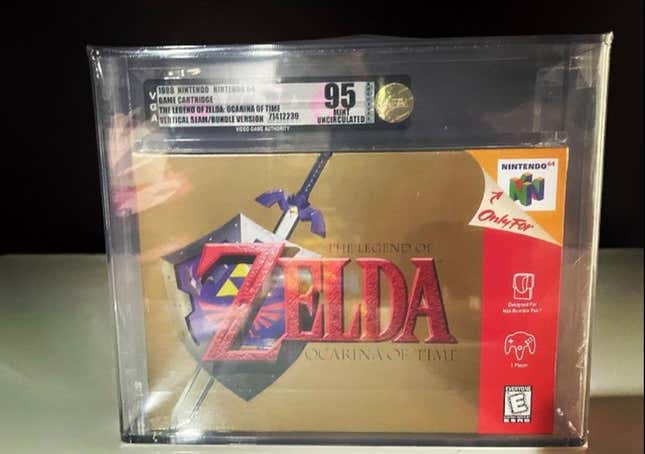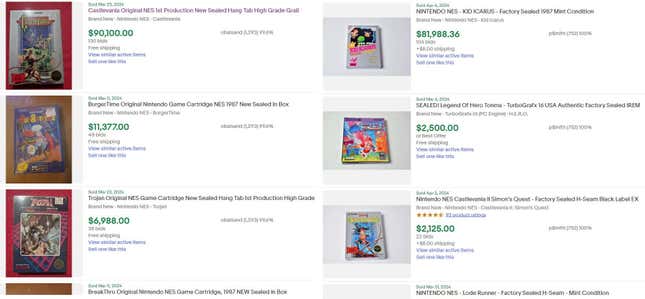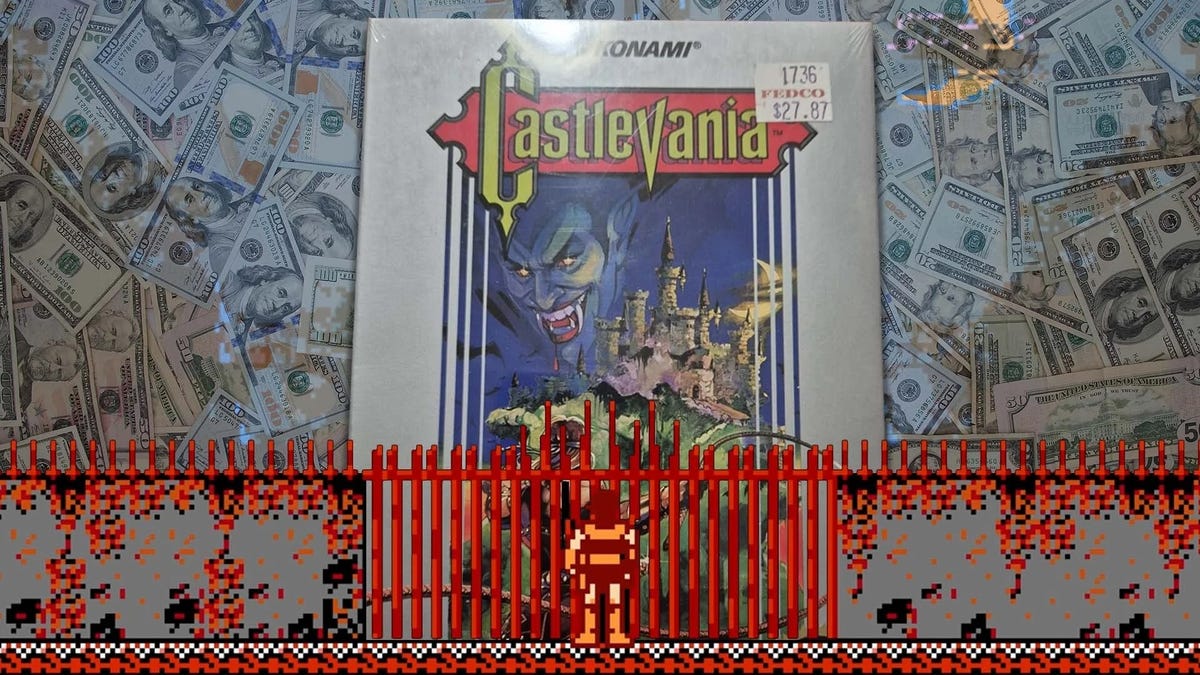Tom Curtin had just secured the video game of his dreams: a factory sealed first run copy of Konami’s original 1986 Castlevania for NES with a rare hang tab on the back of the box. There are only six currently known to exist and Curtin, together with his childhood friend, paid just over $90,000 for this one. Now he had to transport it from Texas safely back to his home in the Northeast.
A Saucy Romance Game Where You Play As Dracula
“I do have friends who literally, just like Mission Impossible, have the Pelican case with the handcuffs,” Tom Curtin, a long-time collector of vintage video games, told me in a recent phone interview. “Honestly, I think the less attention you bring the better.” In the airport he simply put the 38-year old game in an acrylic case, wrapped it in a sweatshirt, and stuffed it in his backpack. Easier to get it out when the TSA scanner inevitably flagged the circuit board inside. “It’s a surreal feeling knowing you are carrying something worth that much on your person,” Curtin said. “Then to take it out and nobody realizes what it is can be funny in the moment.”
Last month, a mysterious trove of some of the rarest games in existence cropped up in the Lone Star state and took the collector world by storm. CGC grader Joseph Ross named it the “Dallas-Fort Worth Collection’’ due to the incredible condition and significance of the games included, from a sticker-sealed copy of Urban Champion, an early NES fighting game, to a mint-condition first print of Metroid, the first entry in Nintendo’s beloved alien platformer series. While it’s common for high-end collectibles to circulate in private between collectors, it’s much rarer for them to come to market from a previously unknown source.
Memorabilia site cllct reports that the “Dallas-Fort Worth Collection’’ previously belonged to two brothers who began collecting back in the 1980s and sometimes purchased multiple sealed copies of games. When they passed away, their collection was seemingly liquidated in an estate sale, which is when part of it made its way into the hands of the mysterious Dallas buyer who immediately began listing items on eBay, including the copy of Castlevania coveted by Curtin. They were un-graded, meaning potential bidders had to discern with their own eyes what they thought the condition might be, analyzing the listing photos for any signs of wear.
Curtin was on one of his annual vacations with his childhood friend when he heard his personal “Grail” (a collecting term for prize trophies that drive the hobby’s most passionate obsessives)had suddenly appeared on eBay. He’d tried to acquire one of the five previously known sealed copies in the past, so rare in part because of a cardboard tab built into the box only in the earliest shipments, but the existing owners weren’t selling.
“I get up Sunday morning and I was just kind of sitting there going through my feeds and somebody had posted in one of the Facebook groups that I’m in and I freaked out,” Curtin said. “I was like, there’s no freaking way, and as soon as I went to eBay and saw the listing, I knew it was legit. I knew it was the real deal.”
A Castlevania heist decades in the making
He told Kotaku he wasn’t initially planning to take a swing at it, speculating a bidding war could send the final price well into the six figures. His friend helped convince him otherwise. Not a collector himself, Curtin’s enthusiasm must have rubbed off on him. They would go in on the purchase together. “He asked me a ton of questions, of course, because that is a ridiculous amount of money,” Curtin said. “And I don’t I don’t want that to be lost here. We’re not what I would consider rich, you know? I think that we do well, but I wouldn’t say we’re rich.”
While the splashiest near-million dollar retro game sales in recent years have been arranged by Heritage Auctions, long-time collectors have been navigating eBay for valuable hauls for years. Curtin said that was how he originally got into vintage game collecting, scooping up sealed copies of games from local stores and flipping them online. He made waves back in 2012 when he sold a prototype of The Legend of Zelda for $55,000 on eBay.
Over a decade later, Curtin was prepared to pay almost double for Castlevania, the first game he’d ever owned after picking it out of a catalog sight-unseen back when his mom bought him and his brother their original NES. Curtin thought the name sounded cool at the time and the guy on the phone said it had great graphics. Now he’d have to pull the timeless eBay trick of bidding right before the last seconds on the timer ticked off to secure the rarest version of it.
“I just went old school and with a few seconds left, put our bid in to get it done,” Curtin said. “I felt really good. I know it sounds crazy, trust me, but I did feel good about the $90,100 just because I thought for sure was going to go into the six figures.” When it was revealed as the winning bid, eBay’s highest sale price ever for a video game, he immediately called his friend who had been watching from his house. The two hatched a plan to fly out to Texas to pick it up in person, swing over to Florida to get it graded by CGC, and then fly back home to New England where they would deposit it in a bank vault.

“Our adventure to pick it up will be something I look back on forever,” Curtin told Kotaku in a follow-up email. “Our journey included us returning an electric vehicle with one mile of range left, running through the airport, literally, and getting in the boarding area as they announced doors were closing is pretty funny considering the cargo. We took four flights in three days. I kept picturing us being stranded on the side of the road with a $100k collectible game on us.”
If the first movement of truth was securing the winning bid, the second was attaining a grade from CGC that would make the investment worth it. Curtin said he was never really in doubt about the near-mint condition of the Castlevania copy, despite some naysayers online. “A lot of people online have talked about, like, oh, there’s damage here, there’s damage there and I think that’s where my experience really came into play,” he said. “Because I saw things that I knew were just normal versus things that people saw as wear, so I had a good feeling of where it would grade.”
Curtin’s Grail Castlevania ended up with a 9.4 A+ rating, and some already think he could resell it. “Curious to see the future of this piece,” collector Frank “Grailmonster” Giaramita, who Kotaku has interviewed previously about rare Funko Pops, posted on Instagram after Curtin outbid him in the eBay auction. “It’s a $250K flip IMO. To my knowledge, this is the most a raw game has ever sold for.”
But the new owners aren’t planning to sell it anytime soon. “People online have said, ‘Oh, it’s going to be flipped, just keep an eye out for it on Heritage,’ but that was not going to happen,” Curtin told Kotaku. He said the duo will reassess a possible sale in the future as their life circumstances change, or he might even try to buy his friend out for full ownership once he can afford to. “I fully realize that this may just be something that I enjoy for a limited period of time, and then there comes a time when I have to sell it and move on,” Curtin said. “But the collector side of me, it being my true Grail, it would be tough to do that.”
The Dallas-Fort Worth Collection goes to Heritage
Castlevania was just one of many Grail-worth finds in the “Dallas-Fort Worth Collection.” As Digital Eclipse editorial director (and former Kotaku features editor) Chris Kohler pointed out earlier this month, the same Dallas seller also parted with a copy of Kid Icarus first listed with a $500 “Buy it now” price for $81,988 and a copy of BurgerTime at $11,000. “Apparently BurgerTime is one of the hardest NES games to find sealed in its original hang tab printing, which accounts for the five-figure price tag,” he tweeted.
The mystery Dallas seller declined an interview request forwarded by Curtin, but is now working directly with Heritage to sell the dozens of other games in the collection. Representatives from the auction house visited it in-person in March, unsure what they would find. “As we walked into his living room, and I saw the games piled on the kitchen table and arranged in several different boxes I knew that we were in for a special ride,” Cris Bierrenbach, a partner at Heritage, told cllct. “Going through each box and finding each was like a true treasure hunt.”

The total number of games consigned to Heritage was 166, ranging from NES to Sega, with all of them in the process of being graded by CGC. They’ll then be listed for sale on the auction house’s website later in the summer. It’ll be a big, new test of where the vintage video game market is at after a peak in 2021 that drew controversy and seemed inflated by a post-covid collecting boom and deep-pocketed outsiders. A Wata graded 9.0 A sealed copy of The Legend of Zelda sold for $870,000 that summer. More recently, a CGC graded 8.0 A version sold for just $288,000. While slight differences in grading can dramatically impact the rarity of a piece, it’s also possible that valuations have come slightly back down to earth as economic conditions have changed.
“Those were real buyers and those were crazy amounts of money,” Curtin said when reflecting on that period. He sold a copy of a Wata graded 8.0 Nintendo World Championship during the 2021 frenzy for $180,000 (he said his cut was less and went to home renovations) but held onto the rest of his collection. “Nobody wants to see their collectibles get cut in half, get cut by 60 or 70 percent, that’s not a great feeling,” he said. “But for me, I own them because I love them. As crazy as that may sound, they’re just plastic and cardboard and shrink wrap, but I love the games because they remind me of my childhood.”
Curtin told Kotaku that if the copy of Castlevania had come up on Heritage three years ago, it would have broken half a million dollars and been out of his league. He also knows most of the buyers who have snatched up the early sales from the Dallas-Fort Worth Collection and said many are longtime fans like him. “They’re all real collectors spending real money to get these Grails that have not come up for auction before so I think that’s really cool to see,” he said. “And I think that that gives you a healthy hobby when things like this don’t get bought and flipped because people don’t like seeing that stuff. It doesn’t feel like a hobby.”
Although little is known about the original owners of the Dallas-Fort Worth Collection, Kohler pointed to it as a potential cautionary tale for current collectors. “It seems again like the lesson here is Sell Your Shit Before You Die,” he tweeted. “These guys seemed to have a lot of forethought about what would be rare and valuable in the future, and their family sold it for pennies.”
